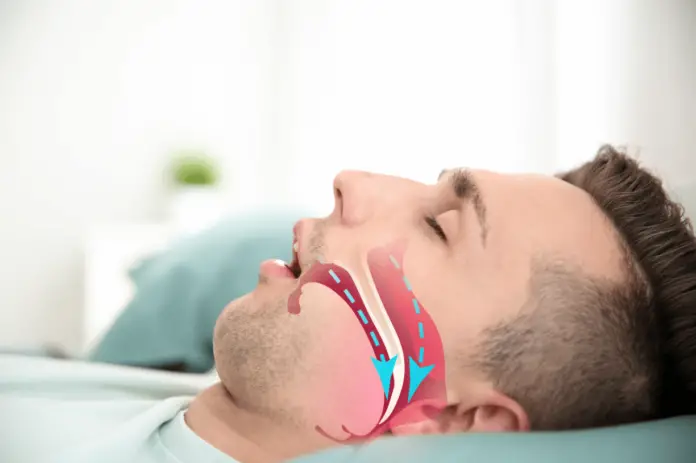Obstructive sleep apnea (OSA) causes breathing troubles in a person during sleep. As the airways get blocked repeatedly, you may feel choked and wake up abruptly from sleep the entire night. Along with sleep disturbance, this condition exposes you to heart health risks as the oxygen level in the blood drops and creates pressure on the organ. An OSA patient can develop irritation and fatigue due to a lack of quality sleep. Although it is a common health problem worldwide, a study shows that nearly 31% of people in Singapore face mid-to-severe sleep apnea issues. Anyone with weight management problems can be especially vulnerable to this.
You must check with your ENT doctor if you snore loudly or feel too sleepy in the daytime despite adequately sleeping through the night. If their diagnosis reveals OSA, they will discuss the possible sleep apnea treatment options based on your health to help you manage it. Some well-known methods include CPAP machines, oral appliances, surgery, and lifestyle changes.
CPAP machine
You face sleep apnea when the relaxed throat muscles and soft tissues hinder your airway. A continuous positive airway pressure device can treat this condition by supplying uninterrupted air to your system through a mask during your sleep. As it helps the passage remain open, your snoring problem reduces while your sleep quality improves.
Mandibular advancement devices (MADs)
While CPAP machines are efficient, some patients may opt for oral devices like MADs. The mouthpieces push your jaw towards the front to help your airway stay open. Some others keep your tongue in its place. You get both customized and OTC choices. Your doctor will recommend what you shall choose and why.
Allergy management
Because of allergic reactions, your nose can become blocked, and you may suffer from sleep apnea. In that case, an ENT can suggest a decongestant for your nose to clear the airways. It will help you breathe easier.
Weight loss
Studies show obesity can trigger this health issue as the fat deposits block the upper airway and prevent muscles from performing their role. One can manage their problem by focusing on diet, exercise, and medications.
Surgery
It is the last recourse taken by ENT to help relieve your symptoms. Different methods can be available. Some may require soft tissue and tonsil removal at the back end of the palate. Others can work on your nose, jawbones, etc.
The options for treatment depend on the severity of OSA. Consult your ENT to understand how complex or mild your condition is. Can you expect to get rid of this? Or, ask if they can help you manage your sleep apnea. Some people try positional therapy as well. However, let the specialist guide you because they see your situation better and know what relief you may need. Any clinic where you get comprehensive ENT services from accredited medical professionals can be your best place for treatment and care. Doctors will make your recovery journey smooth with their continuous support. In Singapore, there are many clinics. So, finding a trusted local clinic will be easier.
The symptoms of Obstructive Sleep Apnea
The common symptoms include snoring, waking up with a dry mouth or sore throat, feeling tired during the day, and difficulty in falling asleep. Other symptoms include daytime sleepiness, forgetting things easily, depression, and irritability. If you experience any of these signs or have a family history of OSA, it is important to visit your doctor for proper diagnosis and treatment as soon as possible.
Treatment Options for Obstructive Sleep Apnea
The primary goal of treating OSA is to restore regular breathing during sleep. Treatment options depend on the severity of the condition and may include lifestyle changes, use of CPAP devices or MADs, allergy management, and surgery. Your ENT doctor will be able to advise you on the best treatment option for your condition. Positional therapy is also an option which helps reduce snoring and improves breathing at night. However, it is important to consult with your doctor before making any changes. Regular visits with your doctor are necessary to ensure that the treatment plan is working effectively and there are no underlying issues. With proper understanding and management, you can gain control over sleep apnea and enjoy a better quality of life.
Things to know more about Obstructive Sleep Apnea
1. If left untreated, it can have severe health consequences like high blood pressure and stroke
2. It is more common in males than females
3. People with an enlarged neck size (more than 17 inches) are prone to sleep apnea
4. Risk factors include type 2 diabetes, smoking, obesity, large tonsils or adenoids, and a family history of the condition
5. Symptoms include snoring, feeling tired during the day, and waking up with a dry mouth or sore throat
6. Treatment methods may include lifestyle changes like quitting smoking and losing weight, use of CPAP devices or MADs, allergy management, and surgery
7. Regularly visit your ENT doctor to discuss the best treatment options for you
8. Make sure to find a good local clinic with experienced medical professionals who will guide and support you during your recovery journey. With proper understanding and management, you can gain control over sleep apnea and experience better quality of life. Talk to your doctor if you have any queries or feel any symptoms.
Conclusion
Sleep apnea is a serious health condition that can cause severe consequences if left untreated. It is important to find the best treatment option for you and follow your doctor’s advice for recovery. Visit any accredited local clinic in Singapore which provides comprehensive ENT services to discuss your problem and get the right help. With proper management, you can gain control over sleep apnea and enjoy a better quality of life.


